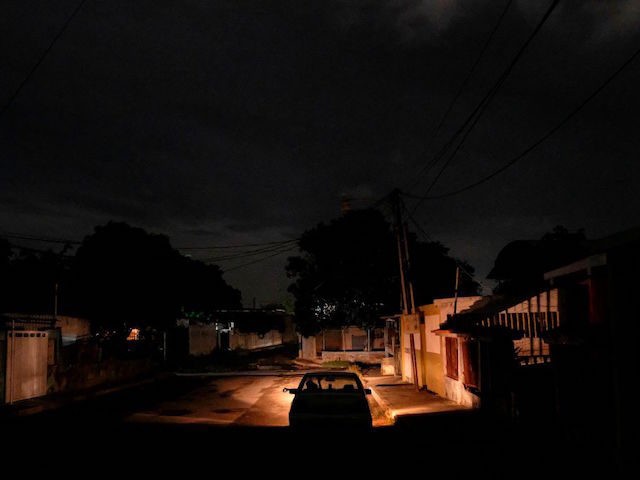An advocacy group organized in response to chronic blackouts in Venezuela revealed on Monday that the nation’s electric grid had failed 80,700 times in 2019, on several occasions plunging the entire country into the dark.
The Committee for the Affected by Blackouts, an independent group that arose in response to the massive national blackout in March that dictator Nicolás Maduro and his cronies blamed on Senator Marco Rubio (R-FL), announced that they had documented the blackouts throughout the year as well as their consequences, given that most of the country’s hospitals and other sensitive infrastructure do not have backup plans when power plants fail.
Aixa López, the head of the committee, said that documenting the blackouts indicated that one national power plant was responsible for much of the chaos, according to the Venezuelan outlet Runrunes.
“We began with nine national blackouts and, what has been the common thread in these nine blackouts? That it is at the El Guri Hydroelectric Center where the problem presents itself,” López said. “Plantacentro [the plant administrators] should be producing 2,600 megawatts and since 2018 we have been warning that Plantacentro has been producing 385 megawatts and has produced zero this month.”
“The patient is not getting better,” López said of the power grid, blaming negligence on the part of Maduro.
“It is lamentable that, to this date [December 16], we have to reveal as dark a tally for the national electric system,” López said. “We have counted 80,700 failures, duplicating prior years.”
Zulia state accounted for half of these failures, followed by Táchira, the far-west state notorious for anti-socialist protests since the Chávez era. Caracas, where Maduro lives, has largely avoided the blackouts, with the glaring example of the March nationwide blackout.
The March blackout lasted days in Caracas and longer elsewhere in the nation, rendering hospitals, police stations, the Caracas airport, and other key service amenities unable to function, and occurred during work rush hour, trapping thousands on congested roads that could no longer rely on traffic lights. Dozens in delicate condition at hospitals died and crime surged. Given the advanced state of social decay in the country, the blackout triggered nearly instant looting and burglary incidents, events that occur regularly when the lights are on but often in conjunction with citizens ashamed of stealing eating out of large piles of garbage, instead.
It was the longest blackout in Venezuela in 30 years and affected 22 of 23 states.
Maduro found enough electricity to immediately blame the blackout on the United States on Twitter.
“The electrical war announced and directed by the imperialist United States against our people will be defeated!” he wrote.
Upon regaining power, Communications Minister Jorge Rodriguez said that Senator Rubio was personally responsible for shutting down electricity in all of Venezuela.
“My apologies to people of Venezuela. I must have pressed the wrong thing on the ‘electronic attack’ app I downloaded from Apple. My bad,” Rubio tweeted in response.
Maduro has not been the legitimate head of state of Venezuela since January, when the National Assembly used its constitutional power to appoint Juan Guaidó the interim president. Maduro has not vacated the presidential palace and retains control of the military, leaving Guaidó powerless to act as president, save to convene protests against Maduro. During the blackout, Guaidó went on CNN to denounce Maduro’s failures.
“There is no service in the hospitals. These were the best hospitals in the country,” Guaidó said. “If we are in the capital what is it like kilometers inside Venezuela where there hasn’t been or there has been very little gasoline with periodic cuts in electricity, without basic goods, with inefficient public transportation? You can say with all responsibility that Venezuela has already collapsed.”
“The cruel attack that the U.S. empire has carried out against the electrical system has been detected and progressively reversed, thanks to the effort of Venezuelan experts and hackers who are working hard to restore tranquility to People,” Maduro said on television following the end of the blackout.
In early December, Venezuela against experienced a near-nationwide blackout, affecting 65 percent of Venezuelan states.
Maduro’s government debuted elaborate Christmas light displays in areas where Maduro and his cronies live in Caracas this month, triggering an outpouring of anger among regular Venezuelan citizens who cannot rely on electricity in their homes to function.
“How can they spend all this money lighting up the entrance to the bridge when the rest of the bridge is dark?” a truck driver told Reuters, noting that a bridge in Maracaibo city was now decked in lavish Christmas lights but lacked street lighting for cars.
“The best representation of what Venezuela is today … the Revolution adorning with lights the shit that we Venezuelans have to eat every day,” a Twitter user griped.

COMMENTS
Please let us know if you're having issues with commenting.